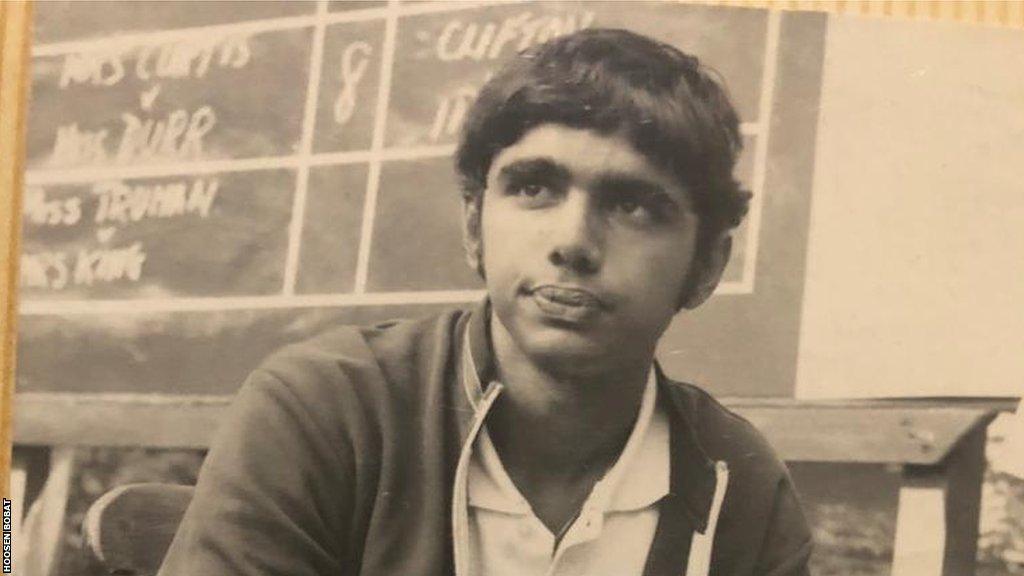Wimbledon: Apartheid policy denied junior star shot at tennis showpiece
- Published

Tennis player Hoosen Bobat was excluded from Junior Wimbledon in 1971
Hoosen Bobat still has more questions than answers about what happened 52 years ago.
Bobat was a promising 18-year-old tennis player from South Africa. He had won his national junior championship and been accepted to compete in the Wimbledon junior championships.
But there was one problem - the colour of his skin.
"About two weeks before Wimbledon was about to start, I received a telegram from the ILTF (International Lawn Tennis Federation) requesting a meeting at the head office in London," said Bobat.
"I was told to bring my captain. I still vividly recall this meeting.
"As we entered the office of LTA secretary Basil Reay we noticed another person sitting in the office, who was vaguely familiar to me, but my captain instantly recognised him as Alfred Chambers, the head of the white racist tennis body in South Africa at the time.
"He was there to object to my entry into junior Wimbledon."
Bobat recalled Chambers saying that he was not South Africa's number one and that he was not affiliated with a recognized body.
As a man of colour Bobat pointed out that he was not allowed to play against the number and that, when he came to the UK, he had joined a tennis club in north London and had competed in many tournaments.
"After about an hour of the meeting Basil Reay got up and said he was going to instruct the All England Club to remove my name from the draw," said Bobat.
"And for me, just like that, it was all over. Game, set and match."
'How different would my life have been?'
The story of Bobat's exclusion from Wimbledon in 1971 may never have reached a wider audience but for Saleem Badat, a professor of history who served as the first black vice-chancellor of Rhodes University in Grahamstown, South Africa.
Badat, who has been friends with Bobat for 48 years and has written a book about non-racial tennis in South Africa during the apartheid era, wrote to the All England Lawn Tennis Association chief executive Sally Bolton in search of an apology.
"She replied that she was too busy to meet and that the (club) historian was looking into the entry process in 1971," said Bobat.
"How different would my life have been if had played at Junior Wimbledon? Wow, it's a dream of every kid to play Wimbledon.
"And, for me, it would have been a gateway to my future tennis career.
"For every black kid back in South Africa it would have been an inspiration. Despite all the struggles and hardships of the apartheid regime it would have been a chance to show that anyone can make it to the top."
Bobat says the book has brought some catharsis but not closure.
"Who decided? Was it one man that decided? Was there a committee meeting? And on what basis did they remove me from the draw? There are many more questions than answers that have come up," he added.
Bolton has since told the BBC: "We are aware of it. Prof Badat has brought it to our attention. It's an important issue and we are spending time investigating what we know about the entries for the Junior Championships in 1971.
"We've reached out and offered to speak to Mr Bobat - we'd be very keen to do that - and now we are focused on trying to best understand, as much as we can from our archives, what exactly happened."